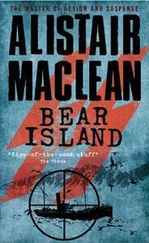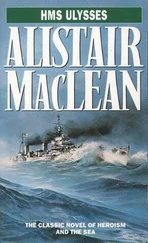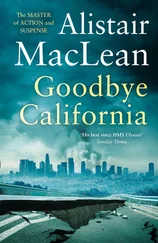Thirteen hundred miles south-east of Prudhoe Bay, at ten p.m., Brady’s men met Jay Shore in the bar of the Peter Pond Hotel in Fort McMurray. Among those qualified to pass judgment on such matters, it was readily agreed that as an engineering construction manager Shore had no peer in Canada. His face was dark, saturnine, almost piratical – which was rather an unfair trick for nature to play on him, since that same nature had made him easy-going, companionable, humorous and cheerful.
Not that he felt in the least humorous and cheerful at that moment. Nor did the man who sat beside him, Bill Reynolds, Sanmobil’s operations manager, a rubicund and normally smiling man to whom nature had given precisely the kind of diabolical mind that Shore appeared to have but didn’t.
Bill Reynolds looked across the table to Dermott and Mackenzie, whom he and Shore had met thirty seconds previously, and said: “You make fast time, gentlemen. Remarkable service, if one may say so.”
“We try,” Dermott said comfortably. “We do our best.”
“Scotch?” asked Mackenzie.
“Thanks.” Reynolds nodded. “Twin jet – is that it?”
“Right.”
“A shade expensive, a man would think.”
“Gets you around.” Dermott smiled.
“Head Office – that’s Edmonton – told us you might take up to four days. We didn’t expect you in four hours. ” Reynolds eyed Dermott speculatively over his newly-poured glass. “I’m afraid we don’t know much about you.”
“Fair enough. We probably know even less about you.”
“Not oilmen, then?”
“Of course. But drilling oilmen. We’re not familiar with mining the stuff.”
“And your full-time job’s security?”
“That’s right.”
“So there’s no need to ask what you were doing up on the North Slope?”
“Right again.”
“How long were you up there?”
“Two hours.”
“Two hours! You mean you can lick a security –”
“We licked nothing. We left.”
“May one ask why?”
“Operations manager was … unhelpful, let’s say.”
“Me and my big mouth.”
“Meaning?”
“I’m the operations manager here. But I get the message.”
Dermott said pleasantly: “No message. You asked a question, I answered.”
“And you decided to walk out –”
“We have a backlog of cases all over the world, and no time to waste trying to help those who won’t help themselves. Let’s not get off on the wrong foot, gentlemen: your company expects Mackenzie and myself to do the questioning while you do the answering. When was this threat received?”
Shore said: “Ten o’clock this morning.”
“You have it with you?”
“Not exactly. It came by phone.”
“Where from?”
“Anchorage. International call.”
“Who took the message?”
“I did Bill here was with me, listening in. Caller gave us his message twice. Word for word he said: ‘I have to inform you that Sanmobil will be incurring a slight interruption in oil production in the near future. Not much, I assure you, just sufficient to convince you that we can interrupt oil flow whenever and wherever we please.’ That was all.”
“No demands?”
“No – surprisingly.”
“Don’t worry. The demands will come when the big threat does. Would you recognise this voice again?”
“Would I recognise the voices of a million other Canadians who talk exactly as he does? You take this threat seriously?”
“I do. We take most things seriously. How good is security at the plant?”
“Well – fair enough for normal circumstances. I suppose.”
“These promise to be highly abnormal circumstances. How many guards?”
“Twenty-four, under Terry Brinckman. He knows what he’s doing.”
“I don’t doubt it. Guard dogs?”
“None. The usual police dogs – Alsatians, Dobermans, boxers – can’t survive in these extreme conditions. Huskies can, of course, but they make lousy watch-dogs – they’re more interested in fighting each other than looking for intruders.”
“Electric fences?”
Shore rolled his eyes upwards and looked sorrowful. “You want to equip the environmentalists with a gallows right on the site? Why, if even the meanest old wolf were to singe its mangy hide …”
“Okay, okay. I suppose it’s pointless to ask about electronic beams, sensor devices and the like?’
“Pointless is right.”
Mackenzie said: “How big is this plant site?
Reynolds looked unhappy. “About eight thousand acres.”
“Eight thousand acres.” Mackenzie’s voice was all doom. “What kind of perimeter would that make for?”
“Fourteen miles.”
“Yes. We have a problem here,” Mackenzie said. “I take it your security duties are twofold: the guarding of vital installations in the plant itself and patrolling the perimeter to keep intruders out?”
Reynolds nodded. “The guards are in three shifts, eight men per shift.”
“Eight men, without any protective aids at all, to guard the plant itself and at the same time patrol fourteen miles of perimeter in the blackness of a winter night.”
Shore was defensive. “Ours is a 24-hour operation. The plant is brilliantly lit day and night.”
“But the perimeter isn’t. A blind man could drive a coach and four – hell, why go on? A couple of army regiments might help, although I doubt even that. As I say, a problem.”
“Not only that,” Dermott said. “All the brilliant illumination in the world isn’t of the slightest help. Not when you’ve got hundreds of workers on each of the three shifts a day.”
“Meaning?”
“Subversives.”
“Subversives! Less than two per cent of the work-force are non-Canadians.”
“There’s been a royal decree abolishing Canadian criminals? When you hire, you investigate backgrounds?”
“Well, not intensive questioning, third degree, lie-detector tests or any of that rubbish. Try that and you’d never hire anyone. We check on previous experience, qualifications, recommendations, and, most important, criminal records.”
“That’s the least important. Really clever criminals never have criminal records.” Dermott looked like a man who had been about to sigh, explode, curse, or quit, but had changed his mind. “Well – it’s late. Tomorrow, Mr Mackenzie and I would like to talk to your Terry Brinckman and look over the plant.”
“If we have a car here at ten o’clock –”
“How about seven o’clock? Yes, seven will be fine.” Dermott and Mackenzie watched the two men go, looked at each other, emptied their glasses, signalled the barman, then looked out through the windows of the Peter Pond Hotel, named after the first white man ever to see the Tar Sands.
Pond went down the Athabasca River by canoe almost exactly two hundred years before. He did not take too much interest in the sands, it appears, but ten years later the much more famous explorer Alexander MacKenzie was intrigued by the sticky substance oozing from outcrops high above the river, and wrote: “The bitumen is in a fluid state, and when mixed with gum, or the resinous substance collected from the spruce fir, serves to gum the Indians’ canoes. In its heated state it emits a smell like that of sea-coal.”
Oddly, the significance of the words “sea-coal” wasn’t appreciated for more than a hundred years; nobody realised that the two 18th-century explorers had stumbled across one of the world’s largest reservoirs of fossil fuels. But had they not so stumbled, there would have been no Peter Pond Hotel where it is today nor, indeed, the township beyond its windows.
Even in the mid-nineteen-sixties Fort McMurray was little more than a rough, primitive frontier outpost, with a population of only thirteen hundred and streets covered with dust, mud or slush according to season. By now, though still a frontier town, it had become a frontier town with a difference. Treasuring its past, but with an eye to the future, it was the epitome of a boom-town and, in terms of burgeoning population, the fastest-expanding township in Canada. Where there were thirteen hundred citizens fourteen years earlier, there were thirteen thousand. Schools, hotels, banks, hospitals, churches, super-markets and, above all, hundreds of new houses were or were being built. And, wonder of wonders, the streets were paved. This seeming miracle stems from one factor and one factor only: Fort McMurray sits squarely in the heart of the Athabasca Tar Sands, the biggest such known deposits in the world.
Читать дальше












